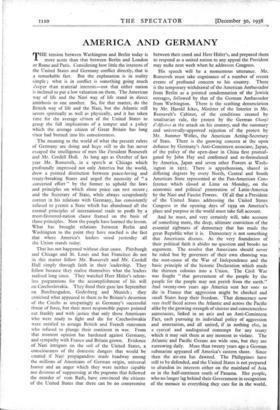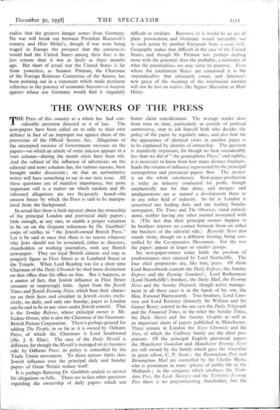AMERICA AND GERMANY
THE tension between Washington and Berlin today is more acute than that between Berlin and London or Rome and Paris. Considering how little the interests of the United States and Germany conflict directly, that is a remarkable fact. But the explanation is in reality simple ; what is in conflict is something going much deeper than material interests—not that either nation is inclined to put a low valuation on them. The American way of life and the Nazi way of life stand in direct antithesis to one another. So, for that matter, do the British way of life and the Nazi, but the Atlantic still severs spiritually as well as physically, and it has taken time for the average citizen of the United States to grasp the full implications of a temper and a policy which the average citizen of Great Britain has long since had burned into his consciousness.
The meaning to the world of what the present rulers of Germany are doing and hope still to do has never escaped the intelligence of men like President Roosevelt and Mr. Cordell Hull. As long ago as October of last year Mr. Roosevelt, in a speech at Chicago which profoundly impressed not only America but the world, drew a pointed distinction between peace-loving and treaty-breaking States and urged the necessity of "a concerted effort" by the former to uphold the laws and principles on which alone peace can rest secure ; and the Secretary of State, while always scrupulously correct in his relations with Germany, has consistently refused to permit a State which has abandoned all the normal principles of international trade to profit by a most-favoured-nation clause framed on the basis of those principles. Now the people have learned the lesson. What has brought relations between Berlin and Washington to the point they have reached is the fact that where America's leaders stood yesterday all the Union stands today.
That has not happened without clear cause. Pittsburgh and Chicago and St. Louis and San Francisco do not in this matter follow Mr. Roosevelt and Mr. Cordell Hull simply through faith in their leadership. They follow because they realise themselves what the leaders realised long since. They watched Herr Hitler's relent- less preparations for the accomplishment of his will on Czechoslovakia. They fixed their gaze last September on Berchtesgaden, Godesberg and Munich ; they criticised what appeared to them to be Britain's desertion of the Czechs as unsparingly as Germany's successful threat of force, but their most responsible papers pointed out frankly and with justice that only those Americans who were ready to fight and die for Czechoslovakia were entitled to arraign British and French statesmen who refused to plunge their continent in war. From that moment opinion has hardened against Germany, and sympathy with France and Britain grown. Evidence of Nazi intrigues on the soil of the United States, a. consciousness of the domestic dangers that would be created if Nazi propagandists made headway among the millions of Americans of German origin, universal horror and an anger which they were neither capable nor desirous of suppressing at the pogroms that followed the murder of vom Rath, have convinced the citizens of the United States that there can be no compromise between their creed and Herr Hitler's, and prepared them to respond as a united nation to any appeal the President may make next week when he addresses Congress.
His speech will be a momentous utterance. Mr. Roosevelt must take cognizance of a number of recent events of profound concern to his country. There is the temporary withdrawal of the American Ambassador from Berlin as a pointed condemnation of the Jewish outrages, followed by that of the German Ambassador from Washington. There is the scathing denunciation by Mr. Harold Ickes, Minister of the Interior in Mr. Roosevelt's Cabinet, of the conditions created by totalitarian rule, the protest by the German Chargé d'Affaires at the attack on his country, and the summary and universally-approved rejection of the protest by Mr. Sumner Welles, the American Acting-Secretary of State. • There is the growing concern at the open defiance by Germany's Anti-Comintern associate, Japan, of the policy of the open-door in China first promul- gated by John Hay and confirmed and re-formulated by America, Japan and seven other Powers at Wash- ington in 1922. There is apprehension, shared in differing degrees by every North, Central and South American State represented at the Pan-American Con- ference which closed at Lima on .Monday, on the economic and political penetration of Latin-America by the Nazi and Fascist Powers. Of all that a President of the United States addressing the United States Congress in the opening days of 1939 on - America's place and purpose in the world must take full account.
And he must, and very certainly will, take account of something more, the deep, ultimate conviction of the essential rightness of democracy that has made the great Republic what it is. Democracy is not something that Americans discuss. As the very foundation of their political faith it abides no question and brooks no argument. The resolve that Americans should never be ruled but by governors of their own choosing was the root-cause of the War of Independence and the basic principle of the historic Declaration which made the thirteen colonies into a Union. The Civil War was fought "that government of the people by the people for the people may not perish from the earth." And twenty-two years ago America sent her sons to die in France that aggression might be checked and small States keep their freedom. That democracy now sees itself faced across the Atlantic and across the Pacific alike by the growing strength of sinister and conscienceless autocracies, linked in an axis and an Anti-Comintern Pact, each pursuing its individual policy of aggression and annexation, and all united, if in nothing else, in a cynical and undisguised contempt for any treaty which it may suit them at any moment to violate. The Atlantic and Pacific Oceans are wide seas, but they are narrowing daily. More than twenty years ago a German submarine appeared off America's eastern shore. Since then the air-era has dawned. The Philippines have still to be defended, and the United States is not prepared to abandon its interests either on the mainland of Asia or in the half-continent south of Panama. Her people, who no longer lag behind their Government in recognition of the menace to everything they care for in the world, realise that the greatest danger comes from Germany. No war will break out between President Roosevelt's country and Herr Hitler's, though if war were being waged in Europe the prospect that the autocracies would find the United States among their foes is far less remote than it was as lately as three months ago. But short of actual war the United States is far from powerless, as Senator Pittman, the Chairman of the Foreign Relations Committee of the Senate, has been pointing out in a statement which made pertinent reference to the potency of economic boycott—a weapon against whose use Germany would find it singularly difficult to retaliate. Recourse to it would be an act of plain provocation, and .Germany would inevitably see in such action by another European State a casus belli. Geography makes that difficult in the case of the United States, and though Mr. Pittman was perhaps dealing more with the potential than the probable, a reminder of what the potentialities are may serve its purpose. Even where the totalitarian States are concerned it is the imponderables that ultimately count, and America's new grasp of the meaning of the totalitarian menace will not be lost on realists like Signor Mussolini or Herr Hitler.



































 Previous page
Previous page